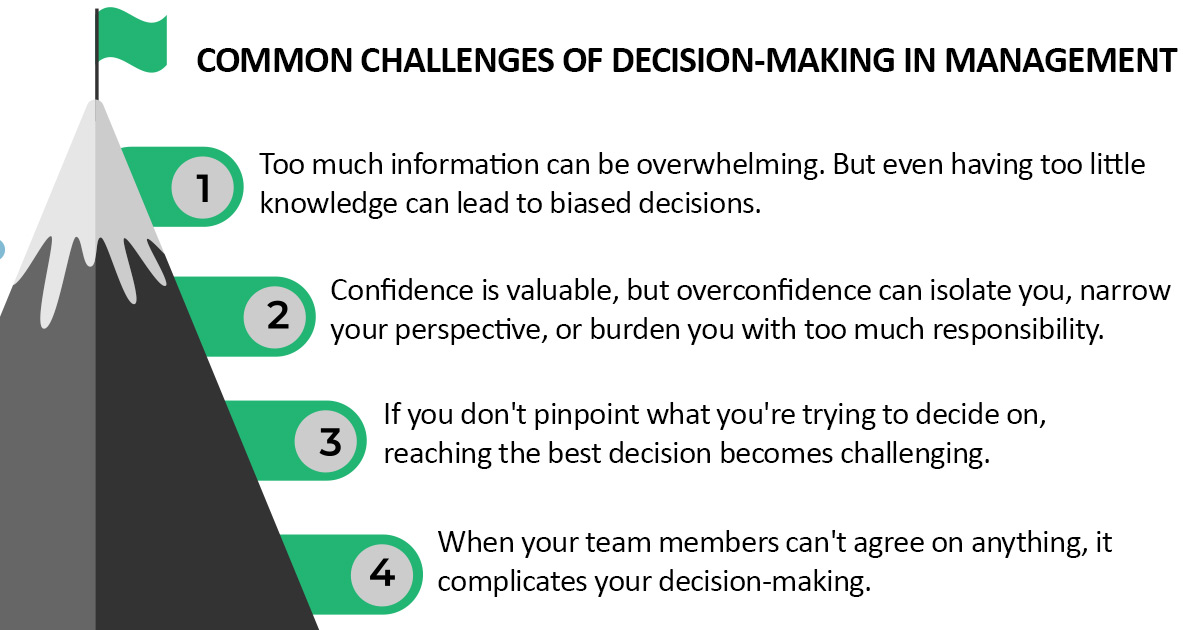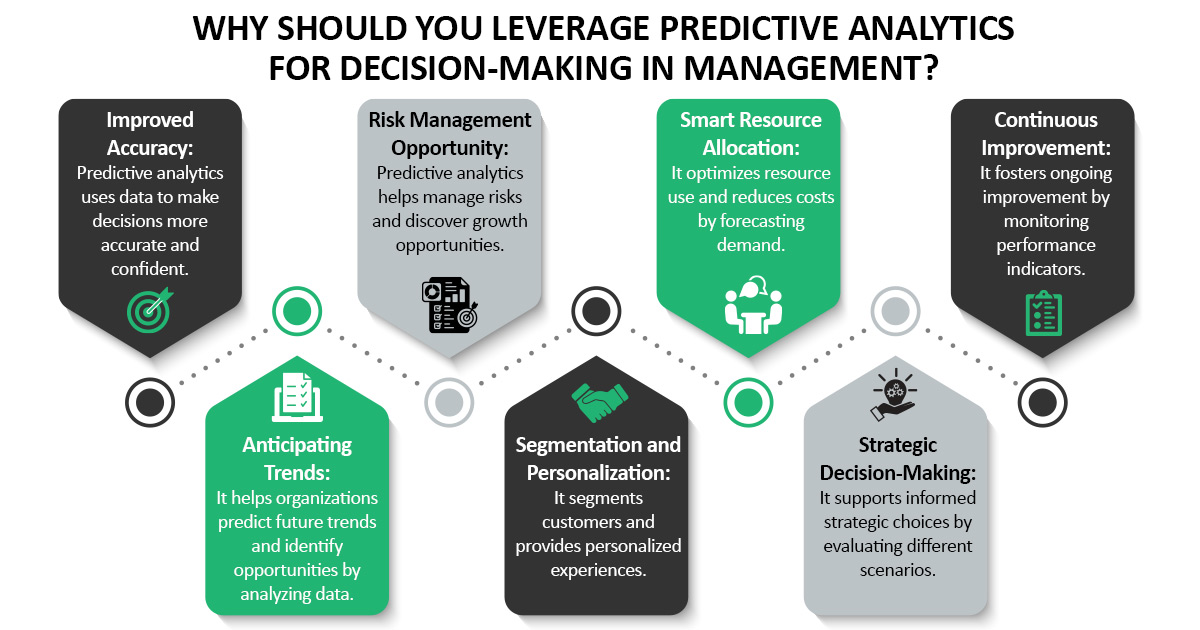
Did you know that, on average, you make around 35,000 conscious decisions every day? Every single day, as a business leader, you find yourself making decisions as simple as meeting room allocation to complex, high-stake strategic decisions such as company acquisition. By any measure, no matter how big or small, decision-making in management can have a ripple effect on your business operations, goals, and future activities. With so many choices to make, you can start to feel overwhelmed by something called "decision fatigue."
To combat decision fatigue, it's essential to know the steps to take to make the best decisions possible. This article discusses why decision-making in management is important, different types of decision-making, steps you must take to make the right decisions, and how modern technology solutions assist in making informed decisions.
What Is Decision-Making in Management?
Decision in management is essentially the process of making choices after identifying a problem, gathering information about potential solutions, and ultimately settling on the best option.
This process can be approached through intuition, where you rely on your gut feelings to determine the most suitable course of action. On the other hand, a logical process relies on concrete facts and figures to make decisions that are scientifically sound.
Intuition can be a valid approach to decision-making in management, especially for simpler, more personal, or time-sensitive decisions. However, when faced with complex choices, it's often best to use a more structured, systematic approach that combines both intuition and logical reasoning. This is particularly crucial in the realm of business decisions to avoid impulsive reactions or hasty intuitions.
In today's digital age, where information is generated incessantly, the wealth of historical data stored in databases worldwide is enormous. Failing to harness this data would be a missed opportunity. That's why many organizations are turning to business and predictive analytics to inform and enhance their decision-making processes.
However, many business leaders find decision-making an overwhelming task. Curious to know why?

Why Is Decision-Making in Management Challenging?
The weight of responsibility can be quite daunting. Your team looks to you for guidance, and sometimes you're pressed for time, leaving little room for careful consideration.
There are instances where the available information doesn't give you a clear path to follow. The fear of making the wrong call can be paralyzing, leading to self-doubt. And let's not forget about decision fatigue, which can leave you feeling utterly drained, even when deciding on the smallest things.
Remember, the possibility of making a not-so-great decision is always there, but the key is to strive for the best decision possible with the information you have at hand. Also, trust your training and knowledge, and continuously work on improving your decision-making processes.

Decision-Making in Management: Key Insights for Optimal Results
Making decisions, especially in the business world, can be a complex task. However, having a structured approach can make it a lot more manageable. You'll likely develop your own decision-making process as you gain experience, but it's always a good idea to start with a solid foundation.
Here are nine practical steps to guide you through decision-making in management, helping you make better managerial decisions:
Clarify Your Objectives
First, it's crucial to start your decision-making journey by identifying your goals. When you're facing a professional decision, having a clear idea of your objectives is key. Once you've identified your goals, it becomes much easier to make informed choices.
Consider What to Avoid
The elimination process is another valuable technique for decision-making in management. It's not just about what you want but also what you want to avoid. Making smart decisions can be a challenge if you're still unsure about your goals. However, if you can identify what you want to avoid, the process of elimination can simplify decision-making.
Utilize SWOT Analysis
The strengths, weaknesses, opportunities, and threats (SWOT) analysis method is a fantastic tool for decision-making in management. It helps you weigh the pros and cons of your options. By filling out a four-part table, you can easily evaluate your choices. Pay attention to the connections between strengths and opportunities, and try to avoid anything that consistently links threats and vulnerabilities.
Visualize Possible Outcomes
Simulating possible outcomes is a helpful step for decision-making in management, even though it can't predict the future with certainty. Drawing from project management concepts and scientific methodologies such as problem trees, SCQA (situation, complexity, question, answer), and MECE (mutually exclusive, collectively exhaustive) can provide a structured approach to visualizing the impact of your decision.
Select the Best Option
Once you've analyzed your options and envisioned the consequences, it's time to choose the best alternative. If you're still uncertain, seeking input from colleagues, the leadership team, or friends can be valuable.
Involve Your Team
Decision-making in management must not be done in isolation. Involve your team in the process to gather diverse viewpoints and encourage creative problem-solving. Research shows that team decision-making can lead to innovative solutions and help uncover hidden biases.

Promote Collaboration
Embrace a collaborative mindset. When making decisions, consider two key mindsets: advocacy and inquiry. “Both involve individuals engaged in debates, drawing on data, developing alternatives, and deciding on future directions. But, despite these similarities, inquiry and advocacy produce very different results,” says HBS Professor David Garvin in Management Essentials.
Establish Psychological Safety
Create and maintain a psychologically safe environment for your team. Psychological safety is essential for high-performing teams. Encourage open communication, respect diverse perspectives, and adapt your communication style to the group's needs to build trust and facilitate effective decisions.
Consistently Revisit the Goals and Purpose of the Decision
Maintain focus on the objectives and rationale behind the decision throughout the decision-making process. According to experts, during discussions, it is easy to become deeply engrossed in a specific aspect of the decision and lose sight of the primary purpose. Therefore, consistently revisiting the purpose becomes even more vital, particularly when dealing with decisions related to intricate initiatives like organizational change. This ensures that the team remains motivated, aligned, and fully comprehends how their individual contributions contribute to overarching objectives.
Strategies for Effective Decision-Making in Management
When it comes to decision-making, you'll encounter both smooth-sailing and tricky situations. To boost your confidence in the choices you make, consider these valuable insights:
Consider Utilizing AI-Powered Solutions
To keep things on track, utilize artificial intelligence-enabled solutions like predictive analytics. Predictive analytics uses algorithms to dive into past and present data, allowing you to make much smarter predictions about the future. These predictive models are like trusted advisors, especially in difficult situations where you need reliable guidance but might not have experts or pros on hand. Additionally, using predictive analytics makes decision-making in management more accurate and consistent.

Emphasize Clear and Regular Communication
Keep everyone involved in the loop by communicating clearly and consistently. This not only helps gather valuable insights but also ensures that everyone understands the direction you're heading.
Don't Let Past Mistakes Hold You Back
Remember, everyone makes mistakes. Don't let previous mistakes make you hesitant about future decisions. Learn from your experiences and use them as stepping stones toward more confident choices in the future.
Today, predictive analytics is reshaping industries, empowering business leaders to make proactive decisions that lay a strong foundation for a successful future. Its impact on decision-making goes beyond mere precision, offering a range of benefits. Leaders in sectors like real estate, supply chain management, software testing, food delivery, and education now rely on predictive intelligence to access real-time insights into customer behavior, market dynamics, and emerging trends. This reliance on predictive analytics equips organizations to not only stay ahead of the competition but also to seize opportunities with a data-driven advantage. Whether through personalized marketing campaigns enhancing customer engagement or supply chain optimizations streamlining operations, success stories underscore the profound influence of predictive analytics across diverse industries.
What Should You Pursue Next for Decision-Making in Management?
Decision-making in management is a multifaceted process that requires a delicate balance of intuition, logical reasoning, and the careful consideration of various factors. The challenges that come with this responsibility, from the weight of leadership to the potential for decision fatigue, are indeed significant. However, by following a structured approach and incorporating modern technology solutions like predictive analytics, you can make more informed and effective decisions. As industries continue to evolve, the fusion of human expertise with modern technology becomes paramount. Wondering how you can seize data-driven opportunities and stay ahead of the competition?
Consider the assistance of predictive solutions like TrueProject to enhance your decision-making prowess. How does TrueProject improve your decision-making abilities in management, you ask? Rich data analytics capabilities allow you to delve deep into the intricacies of your projects, identifying and focusing on the specific items that require attention. With this level of insight, you can undoubtedly optimize your organization’s management processes, mitigate risks, and drive successful outcomes. TrueProject also empowers you to make informed choices based on reliable and accurate data.
With dedication and the right solution, the journey of decision-making in management can become a path to success and growth for both individuals and organizations.
More on TrueProject at www.trueprojectinsight.com
About the Author:
 Nivedita Gopalakrishna is a content marketing specialist within the TrueProject Marketing team with extensive experience in blog writing and website content creation across diverse industries. Nivedita’s proficiency in crafting engaging blog posts and informative website content is a testament to her years of experience. Beyond her prowess in written communication, Nivedita has the knack for creating visually appealing static graphics that have played a pivotal role in expanding TrueProject's marketing efforts. Through thoughtful design choices, she has helped convey the essence of the brand and captivate audiences effectively. Outside the professional sphere, Nivedita is a trained classical singer and a fitness enthusiast, embodying creativity and wellness in and out of the office.
Nivedita Gopalakrishna is a content marketing specialist within the TrueProject Marketing team with extensive experience in blog writing and website content creation across diverse industries. Nivedita’s proficiency in crafting engaging blog posts and informative website content is a testament to her years of experience. Beyond her prowess in written communication, Nivedita has the knack for creating visually appealing static graphics that have played a pivotal role in expanding TrueProject's marketing efforts. Through thoughtful design choices, she has helped convey the essence of the brand and captivate audiences effectively. Outside the professional sphere, Nivedita is a trained classical singer and a fitness enthusiast, embodying creativity and wellness in and out of the office.
Endnotes:
- Sriram. “Decision Making in Management: Importance, Types and Steps.” upGrad, August 24, 2023. https://www.upgrad.com/blog/decision-making-in-management/
- Gavin, Matt. “5 Key Decision-Making Techniques for Managers.” Harvard Business School Online, March 31, 2020. https://online.hbs.edu/blog/post/decision-making-techniques
- “Management Decision Making: What is it, Process, Techniques, and Tools.” Simplilearn, August 10, 2023. https://www.simplilearn.com/management-decision-making-article#:~:text=Decision%2Dmaking%20means%20choosing%20the,help%20achieve%20the%20desired%20outcome.
- Davis, Kevin D. “Decision Making in Management: Importance, Type, Process.” KnowledgeHut, September 05, 2023 https://www.knowledgehut.com/blog/project-management/decision-making-in-management#what-is%C2%A0decision-making-in-management?
- Perry, Elizabeth. “Improve your management skills with a better decision-making process.” BetterUp, January 27, 2023. https://www.betterup.com/blog/decision-making-process-in-management
- “Decision-Making in Management: Importance, Types and Steps.” Indeed, June 25, 2022. https://www.indeed.com/career-advice/career-development/decision-making-in-management





